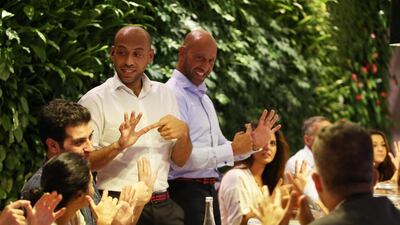DUBAI // Free sign language classes are proving popular with a growing number of people eager to learn how to communicate with the hearing-impaired.
Organised by Feras and Wael Al Moubayed, who have been deaf since childhood, the classes have been running for the past year and regularly attract up to 30 people.
The Syrian brothers now want to start a sign-language school, which they hope to expand across the country and the region.
“Dubai is a relatively open society with people from many backgrounds who are interested in learning new things,” said Feras, who lost his hearing at the age of 2.
“We are here because we think Dubai, or possibly Abu Dhabi, is the right place to start the Al Ayady school, the right place to bring experts in from the UK and to find and train local teachers.”
Wael, who has been deaf since he was 6 months old, said the popularity of the classes was because of the unique learning environment they offered.
“It’s fun,” he said. “You will see how much people enjoy the experience of learning sign language.
“It’s interesting to see how the different signs for things often have a cultural or physical derivation.
“There are also interesting cultural differences between the sign languages used by different countries.
“Sign languages are all different in the UK, US, France, the UAE, Egypt and so on, and there is a gap in the market for sign-language classes.”
The brothers, who were born in Kuwait and educated in the UK, hope the Al Ayady School project will expand from the UAE into Qatar, Oman and Saudi Arabia, with satellite schools eventually opening in other Arab countries, such as Algeria and Egypt, where there are large deaf populations.
Although only British sign language is taught at the classes, there is an continuing project to document Emirati sign language, which has similarities to British.
Overcoming the stigma of disabilities such as deafness is still a challenge, admits Feras.
“The Government is trying to change that and hopefully we can play our part. Every person, regardless of their background or ability, deserves to have an opportunity to lead a happy and fulfilled life.”
Ahmad Jaber, a personal trainer in Dubai, started attending classes initially to communicate with three of his clients at boot camp.
“I love being able to communicate with people,” Mr Jaber said. “I picked it up very quickly but it means for me we can have more meaningful conversations.”
Such is the demand for sign language classes that a travelling roadshow visited Abu Dhabi, Dubai, Al Ain, Sharjah and Fujairah in April this year, teaching hundreds of adults and children sign language.
The Hear Us Sign campaign saw a customised lorry make stops across the UAE to engage the deaf community.
It marked the start of the Hear My Voice – Empowering the Deaf conference.
Services for deaf and hearing impaired residents are improving.
Since January last year, the Ahmed bin Hanbal Mosque in Sharjah city has been providing worshippers at its Friday sermons with a free sign- language service.
Given in Arabic, it was launched after a member of the public made a suggestion to Sharjah’s Islamic authorities.
During sermons the mosque is divided into two sections. Deaf people sit to the far right of the prayer hall with a translator in front of them who passes on the message as it is delivered by the preacher.
The Word Health Organisation says more than 5 per cent of the world’s population – about 360 million – has disabling hearing loss.
There are no UAE statistics about the prevalence of deafness and hearing disabilities, although it is estimated there are about 8 million deaf people in the region.
mswan@thenational.ae

